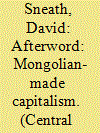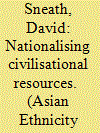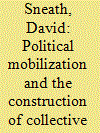| Srl | Item |
| 1 |
ID:
160849


|
|
|
|
|
| Summary/Abstract |
Oligarchy (oligarhi) has become a well-worn Mongolian term for describing the social order. Real power and wealth is now said to be monopolized by a small number of super-elite families. The roots of this oligarchic capitalism lie in the process by which ownership was acquired and concentrated so as to take control of companies, rather than simply making profitable investments. The emergent form resembles Thomas Piketty's notion of ‘patrimonial capitalism’, a political economy dominated by inherited private capital, rather than the wealth created by entrepreneurship or innovation. Mongolian capitalism can also be seen as patrimonial in another sense. Its roots lie in the opportunistic struggle over a form of national patrimony: the enterprises and resources inherited from the previous political economy. The new proprietorial class already appears faintly dynastic, and presently there seem to be no barriers to the transmission of wealth to the next generation of super-rich.
|
|
|
|
|
|
|
|
|
|
|
|
|
|
|
|
| 2 |
ID:
135770


|
|
|
|
|
| Summary/Abstract |
This paper is concerned with the historical process by which elements drawn from a religious ‘civilisation’ have been reinvented as specifically national phenomena. It examines the Mongolian state ceremonies for sacred mountains conducted by the President as an example of the reinvention of an institution originally produced by the wider culture or civilisation of the Buddhist ecumene encompassing both Mongolia and Tibet. Such ritual, I argue, can be thought of as ‘cosmopolitical’ in that sense that they engaged with non-humans as actors in the political arena. Furthermore, the contemporary reinvention of these practices has generated a space for a very different, but also cosmopolitical, register for conceiving of relations between human persons and the landscape.
|
|
|
|
|
|
|
|
|
|
|
|
|
|
|
|
| 3 |
ID:
100026


|
|
|
|
|
| Publication |
2010.
|
| Summary/Abstract |
In the twentieth century, Mongolia became subject to the Soviet version of nationalist thought. As the state constructed a single national 'people' (undesten, ard tumen) it also, following the Soviet model, constructed the past in terms of tradition (ulamjlal), and launched the ethnographic project of identifying and describing sub-national 'ethnic' groups or tribes (aimag, yastan). Since the collapse of Soviet-style state socialism and the introduction of multi-party parliamentary politics, notions of both tradition and collective identity have become potential resources, particularly for politicians, to mobilize public support. Concepts of 'local homeland' (nutag) are particularly significant, reflecting to some degree the importance of social networks. This paper explores the ways in which Mongolians reconstruct tradition, assert collective identity and deploy concepts of belonging.
|
|
|
|
|
|
|
|
|
|
|
|
|
|
|
|